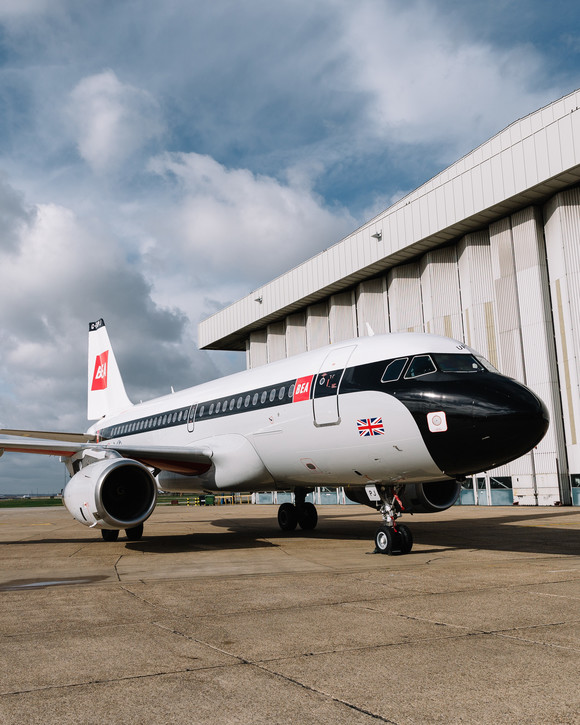
British Airways unveiled British European Airways (BEA) design for its heritage liveries series to mark its centenary
- A319, reg G-EUPJ, arrived at Heathrow this morning in British European Airways colours
- The aircraft will fly domestic and European routes, heading first to Manchester
- British Airways is painting selected aircraft in heritage designs to mark its centenary
LONDON, UK, 2019-Mar-05 — /Travel PR News/ — British Airways today (March 4, 2019) unveiled the second in its series of heritage liveries – a British European Airways (BEA) design on an Airbus 319 – as it touched down at Heathrow this morning.
The arrival drew large crowds to Shannon, where the aircraft was painted, and Heathrow, British Airways’ home.
The A319, registration G-EUPJ, is adorned with the BEA livery, which flew predominantly on domestic and European routes between 1959 and 1968. However, there is one significant difference with the replica; the aircraft will have a grey upper wing, rather than the traditional red, to meet current wing paint reflectivity requirements.
The aircraft, which has been painted to mark British Airways’ centenary, enters service this afternoon with its maiden commercial flight in its new colours to Manchester. After this, it will continue to fly routes across the UK and Europe, with the design remaining on the aircraft until it retires next year. As with the British Overseas Airways Corporation (BOAC) liveried 747, the aircraft can be followed using tracking website Flightradar24, which will feature a special image of the livery.
Alex Cruz, British Airways’ Chairman and CEO, said: “It was another really special day as we welcomed our BEA liveried A319 in to Heathrow this morning, which forms part of our centenary heritage fleet. Yet again there were huge crowds lining the perimeter fence to see the aircraft coming in, which shows just how excited people are about these designs. We’ve been overwhelmed with positive feedback from customers and colleagues.”
The BEA liveried A319 is the second aircraft with heritage designs to enter the British Airways fleet following the arrival of its BOAC 747 long-haul counterpart last month. Next to arrive with be another 747, this time with a British Airways Landor livery. And one final design will be revealed later this month as the airline celebrates its past while looking to the future.
In its centenary year British Airways is hosting a range of activities and events. As well as looking back, the airline is also hosting BA 2119 – a programme, which will lead the debate on the future of flying and explore the future of sustainable aviation fuels, the aviation careers of the future and the customer experience of the future.
The airline will be working with expert partners to identify BA’s 100 Great Britons; the people up and down the country who are currently shaping modern Britain, and of course, the year would not be complete without some special flying and moments for customers.
The centenary activity is taking place alongside the airline’s current five-year £6.5bn investment for customers. This includes the installation of the best quality WiFi and power in every seat, fitting 128 long-haul aircraft with new interiors and taking delivery of 72 new aircraft. The airline will also be introducing new Club World seat with direct aisle access later this year.
Notes to editors:
A potted history of BA:
- On August 25, 1919, British Airways’ forerunner company, Aircraft Transport and Travel Limited (AT&T), launched the world’s first daily international scheduled air service between London and Paris.
- In 1924, Britain’s four main fledgling airlines, which had by then evolved into Instone, Handley Page, Daimler Airways (a successor to AT&T), and British Air Marine Navigation Company Limited, merged to form Imperial Airways Limited.
- By 1925, Imperial Airways was providing services to Paris, Brussels, Basle, Cologne and Zurich. Meanwhile, a number of smaller UK air transport companies had started flights and in 1935, they merged to form the original privately-owned British Airways Limited, which became Imperial Airways’ principal UK competitor on European routes.
- Following a Government review, Imperial Airways and British Airways were nationalised in 1939 to form British Overseas Airways Corporation (BOAC). Continental European and domestic flights were flown by a new airline, British European Airways (BEA) from 1946. BOAC introduced services to New York in 1946, Japan in 1948, Chicago in 1954 and the west coast of the United States in 1957. BEA developed a domestic network to various points in the United Kingdom, including Belfast, Edinburgh, Glasgow and Manchester.
- From 1946 until 1960, BOAC and BEA were the principal British operators of scheduled international passenger and cargo services – and they preserved Britain’s pioneering role in the industry. The 1950s saw the world enter the passenger jet era – led by BOAC, with the Comet flying to Johannesburg in 1952, halving the previous flight time.
- Additional airlines began to pass into BEA’s ownership and in 1967, the Government recommended a holding board be responsible for BOAC and BEA, with the establishment of a second force airline, resulting in British Caledonian being born in 1970.
- Two years later, the businesses of BOAC and BEA were combined under the newly formed British Airways Board, with the separate airlines coming together as British Airways in 1974.
- In July 1979, the Government announced its intention to sell shares in British Airways and in February 1987 British Airways was privatised.
- In January 2011 the International Consolidated Airlines Group (IAG) was formed when British Airways and Iberia merged. IAG has since also become the parent company of Aer Lingus, and Vueling and in 2017, IAG launched LEVEL a new low-cost airline brand that operates from Barcelona, Paris and Vienna.
Contact Details:
For more information please contact press.office@ba.com.
Source: BRITISH AIRWAYS
###
